人教版(2019)选择性必修 第一册Unit 2 Looking into the Future Discover Useful Structures课件(共19张PPT)
文档属性
| 名称 | 人教版(2019)选择性必修 第一册Unit 2 Looking into the Future Discover Useful Structures课件(共19张PPT) |
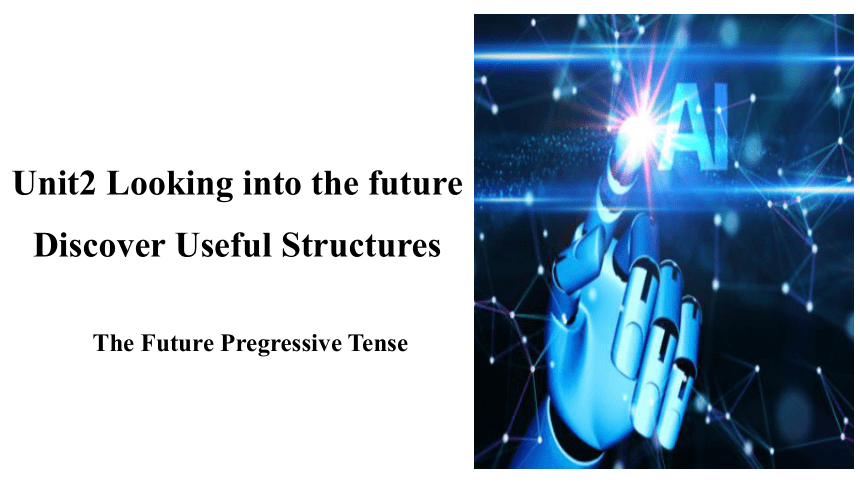
|
|
| 格式 | pptx | ||
| 文件大小 | 1.1MB | ||
| 资源类型 | 教案 | ||
| 版本资源 | 人教版(2019) | ||
| 科目 | 英语 | ||
| 更新时间 | 2024-10-08 23:37:02 | ||
图片预览

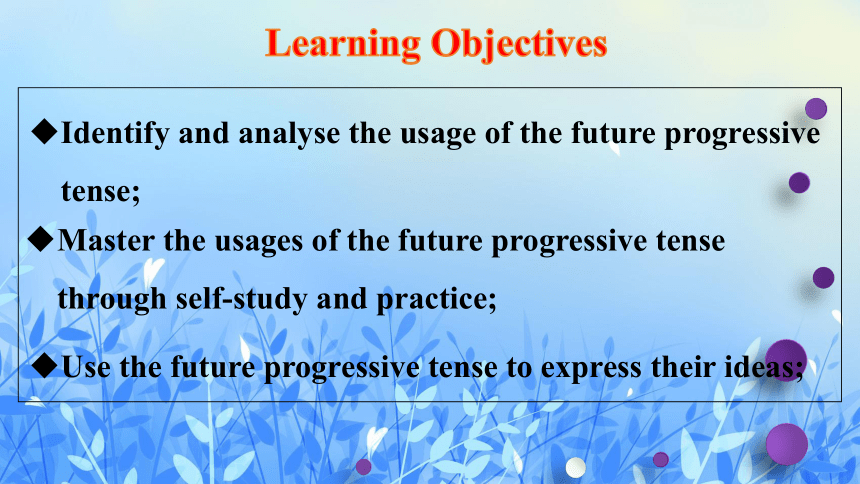
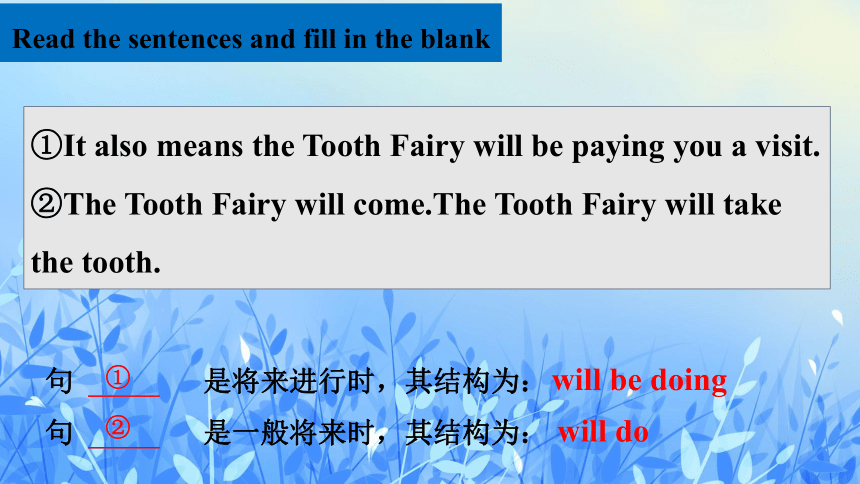
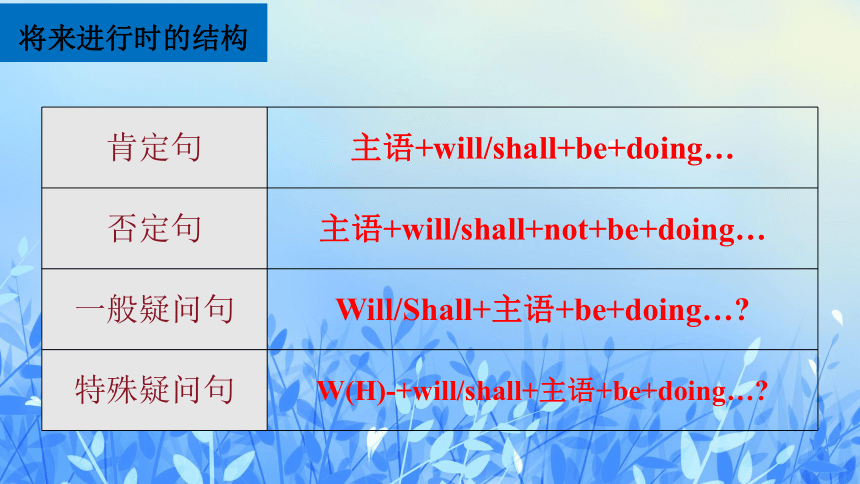
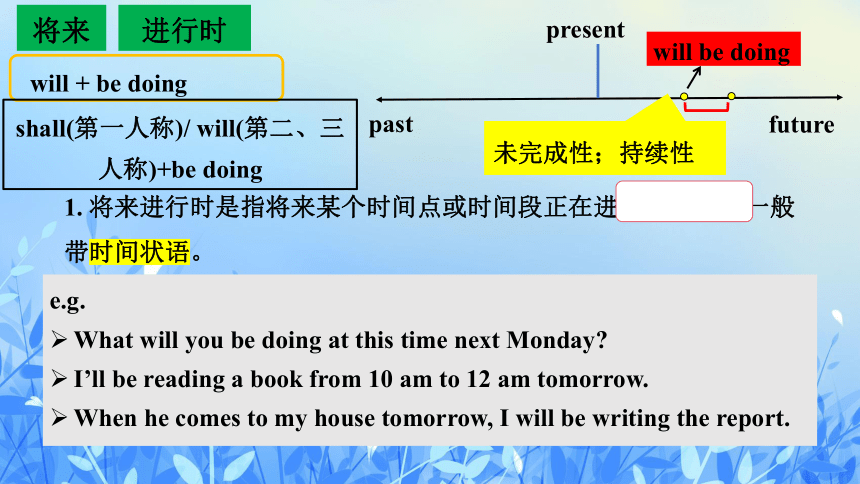
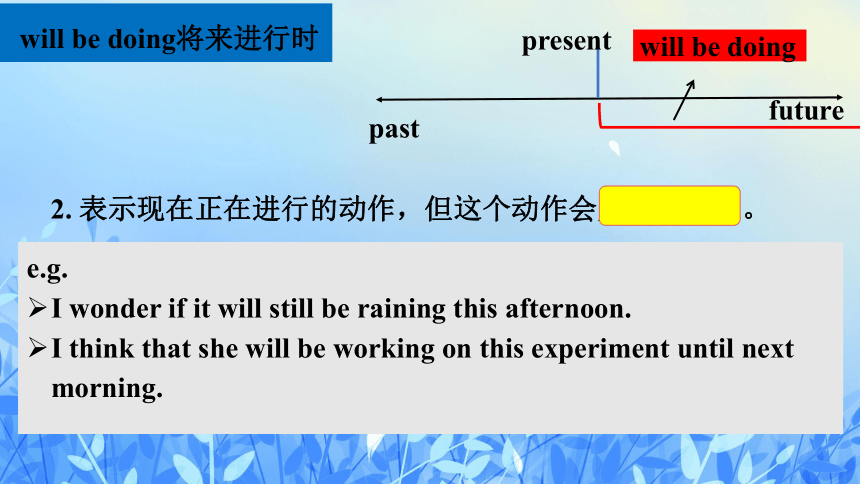
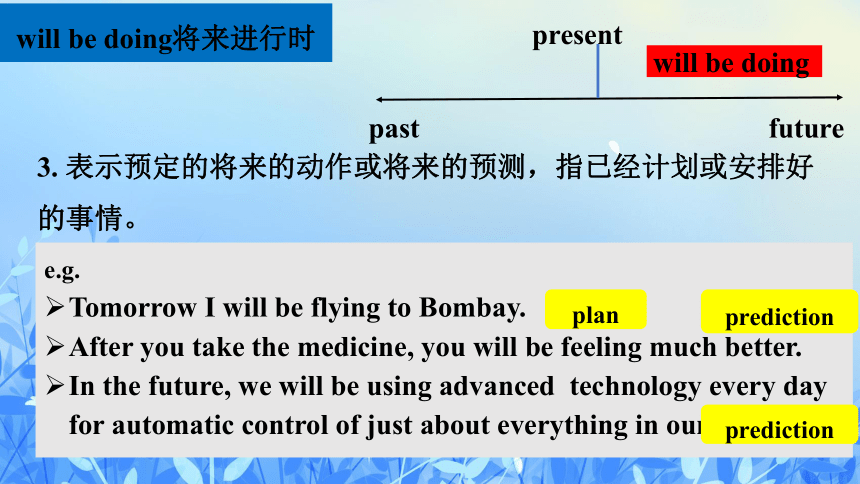
文档简介
(共19张PPT)
The Future Pregressive Tense
Unit2 Looking into the future
Discover Useful Structures
Identify and analyse the usage of the future progressive tense;
Master the usages of the future progressive tense through self-study and practice;
Use the future progressive tense to express their ideas;
Learning Objectives
①It also means the Tooth Fairy will be paying you a visit.
②The Tooth Fairy will come.The Tooth Fairy will take the tooth.
句 是将来进行时,其结构为:
句 是一般将来时,其结构为:
①
will be doing
②
will do
Read the sentences and fill in the blank
肯定句 主语+will/shall+be+doing…
否定句 主语+will/shall+not+be+doing…
一般疑问句 Will/Shall+主语+be+doing…
特殊疑问句 W(H)-+will/shall+主语+be+doing…
将来进行时的结构
1. 将来进行时是指将来某个时间点或时间段正在进行的动作。一般带时间状语。
e.g.
What will you be doing at this time next Monday
I’ll be reading a book from 10 am to 12 am tomorrow.
When he comes to my house tomorrow, I will be writing the report.
present
will be doing
past
future
将来
will + be doing
进行时
未完成性;持续性
shall(第一人称)/ will(第二、三人称)+be doing
2. 表示现在正在进行的动作,但这个动作会延续到将来。
present
will be doing
past
future
e.g.
I wonder if it will still be raining this afternoon.
I think that she will be working on this experiment until next morning.
will be doing将来进行时
3. 表示预定的将来的动作或将来的预测,指已经计划或安排好的事情。
present
will be doing
past
future
e.g.
Tomorrow I will be flying to Bombay.
After you take the medicine, you will be feeling much better.
In the future, we will be using advanced technology every day for automatic control of just about everything in our home.
plan
prediction
prediction
will be doing将来进行时
1. 将来进行时是指将来某个时间点或时间段正在进行的动作。一般带时间状语 at this time; 7 o‘clock ; then...+将来时间。
2. 表示现在正在进行的动作,但这个动作会延续到将来。
3. 表示预定的将来的动作或将来的预测,指已经计划或安排好的事情。
Summary
Do you know the differences between the two tenses
一般将来时 VS 将来进行时
I’ll read a book tomorrow.
明天我要看书。
一般将来时是指将来某个时间将要发生的动作和状态,
基本结构是:主语+will do sth / be going to do.
I’ll be reading a book at 10: 00 tomorrow.
明天十点我将正在看书。
将来进行时是指将来某个时间正在进行的动作。
基本结构是:主语+will be doing.
一般将来时 VS 将来进行时
⑴ When will you finish these letters
你什么时候处理完这些信件?
When will you be seeing Mr White
你什么时候会见怀特先生呢?
两者均可表示将来,但用将来进行时语气更委婉。
⑵ When will you pay back the money
你什么时候还钱
When will you be paying back the money
你计划什么时候还钱呢
一般将来时 VS 将来进行时
(直接询问,如上司对下属)
(委婉地询问,如下属对上司)
(似乎在直接讨债)
(委婉地商量)
一般将来时 VS 将来进行时
一般将来时既可表示“将来”,也可表示“意志,意图”;
将来进行时表示“纯粹的将来”,指说话者一种无意图的动作。
⑴ I'll do my best.
I'll be doing my best.
我愿尽最大的努力。
意愿
我将尽最大的努力。
纯粹的将来
(2) Tom will cut the grass tomorrow.
Tom will be cutting grass tomorrow.
汤姆明天将正在割草。
汤姆明天愿意割草。
意愿
纯粹的将来
1.He _______________ (lie) on one of the sunny beaches in Hawaii all day when he spends his holiday there.
2. Don't call me between 2:00 and 4:00 this afternoon. I
_____________________ (have) an test then.
3. Nobody knew what ___________________ (happen) to the Earth in a century's time.
4. Mr. Lee said he would give the CD to me as soon as he _______________
(return) from Canada.
5. When we were young, father ___________________ (take) us for a special treat on Mother's day.
will be lying
will/ shall be having
would happen
returned
would take
Fill in the blanks
6.—Did you invite Sarah to your birthday party
—Sorry, I forget. I ____________ (call) her now.
7.You can't miss him. He _________________ (wear) a dark green suit and a yellow tie waiting for you.
8. I ___________________ (tell) you about my plan, but you stopped me before I could speak.
9. Will you ______________ (use) your computer this time tomorrow
10. I _____________________ (close) the kitchen door when a little mouse popped its head out.
will call
will be wearing
was about to tell
be using
was about to close
1.快!客人就要来了!
Hurry up! The guests at any minute!
2.我们将在澳大利亚过冬。
the winter in Australia.
3.我要写信告诉皮特先生关于汤姆的新房子的事。
Mr. Pitt and tell him about Tom’s new house.
4.请你把钢琴搬进这里来,好吗?
the piano in here
5.现在他们正坐在教室里听录音。明天这个时候他们会坐在电影院里看电影。
Now they in their classroom and listening to a tape. This time tomorrow they in the cinema.
will be arriving
We’ll be spending
I’ll write to
Will you please bring
are sitting
will be sitting
Complete the sentences
Jack goes to school every weekday. He leaves hnome at 6:45 and arrives at school at about 7:30. His morning classes begin at 8:00 and continue until 12:15. Then he has lunch, which takes about half an hour, His classes begin again at 1:30 in the afternoon and end at 3:50. He goes to the school's football club at 4:30 and finishes practice at 6:00.He arrives home at about 6:45. Every day he follows the same routine and tomorrow will be no exception.
1 At 6:30 a.m.tomorrow,... A he'll be leaving the house. B he'll be at home.
2 At 8:10 a.m.tomorrow,… A he'll be having a class. B he'll have a class.
3 At 12:30 tomorrow,… A he'll be having lunch. B he'll have lunch.
4 At 5:00 p.m.tomorrow,… A he'll be practising football. B he’ll practise football.
5 At 6:45 p.m.tomorrow,…A be ll be arriving home. B he’ll arrive home.
√
√
√
√
√
Read the passage and complete the following sentences
Monday Fly to Beijing from Melbourne,arrive at 10:00am;Visit the Summer Palace Museum in the afternoon
Tuesday Moring:visit the Palace Museum ;Afternoon:go to Wangfujing Street
Wednesday Go to the Great Wall,three hour’s drive there and back
Thurday Go sightseeing in Shanghai;Visit National Museum of China
Friday Trip to Zhangjiakou
Saturday Back to Beijing in the afternoon;Visit Beijing Opera at the Mei Langfang Theatre
Sunday Return to Melbourne
Work in Pairs:Read the travel plan and make up a conversation using the future progressive tense
I hear that you will travel to China. Wow! It's wonderful! How many days will you be there How will you get there
Altogether seven days. I will fly to Beijing on Monday morning. And I will arrive there at 10:00 a.m.
What will you plan to do after your arrival
Of course, first I will check in the hotel. After lunch, I will have a short break. For the afternoon, I will be visiting the Summer Palace.
Read the travel plan of part 4 and make up a conversation using the future progressive tense.
From the information of the chart, we can make up sentences like:
I will be flying to Beijing from Melbourne.
I will be arriving at 10:00 a.m..
I will be visiting the Summer Palace in the afternoon.
The Future Pregressive Tense
Unit2 Looking into the future
Discover Useful Structures
Identify and analyse the usage of the future progressive tense;
Master the usages of the future progressive tense through self-study and practice;
Use the future progressive tense to express their ideas;
Learning Objectives
①It also means the Tooth Fairy will be paying you a visit.
②The Tooth Fairy will come.The Tooth Fairy will take the tooth.
句 是将来进行时,其结构为:
句 是一般将来时,其结构为:
①
will be doing
②
will do
Read the sentences and fill in the blank
肯定句 主语+will/shall+be+doing…
否定句 主语+will/shall+not+be+doing…
一般疑问句 Will/Shall+主语+be+doing…
特殊疑问句 W(H)-+will/shall+主语+be+doing…
将来进行时的结构
1. 将来进行时是指将来某个时间点或时间段正在进行的动作。一般带时间状语。
e.g.
What will you be doing at this time next Monday
I’ll be reading a book from 10 am to 12 am tomorrow.
When he comes to my house tomorrow, I will be writing the report.
present
will be doing
past
future
将来
will + be doing
进行时
未完成性;持续性
shall(第一人称)/ will(第二、三人称)+be doing
2. 表示现在正在进行的动作,但这个动作会延续到将来。
present
will be doing
past
future
e.g.
I wonder if it will still be raining this afternoon.
I think that she will be working on this experiment until next morning.
will be doing将来进行时
3. 表示预定的将来的动作或将来的预测,指已经计划或安排好的事情。
present
will be doing
past
future
e.g.
Tomorrow I will be flying to Bombay.
After you take the medicine, you will be feeling much better.
In the future, we will be using advanced technology every day for automatic control of just about everything in our home.
plan
prediction
prediction
will be doing将来进行时
1. 将来进行时是指将来某个时间点或时间段正在进行的动作。一般带时间状语 at this time; 7 o‘clock ; then...+将来时间。
2. 表示现在正在进行的动作,但这个动作会延续到将来。
3. 表示预定的将来的动作或将来的预测,指已经计划或安排好的事情。
Summary
Do you know the differences between the two tenses
一般将来时 VS 将来进行时
I’ll read a book tomorrow.
明天我要看书。
一般将来时是指将来某个时间将要发生的动作和状态,
基本结构是:主语+will do sth / be going to do.
I’ll be reading a book at 10: 00 tomorrow.
明天十点我将正在看书。
将来进行时是指将来某个时间正在进行的动作。
基本结构是:主语+will be doing.
一般将来时 VS 将来进行时
⑴ When will you finish these letters
你什么时候处理完这些信件?
When will you be seeing Mr White
你什么时候会见怀特先生呢?
两者均可表示将来,但用将来进行时语气更委婉。
⑵ When will you pay back the money
你什么时候还钱
When will you be paying back the money
你计划什么时候还钱呢
一般将来时 VS 将来进行时
(直接询问,如上司对下属)
(委婉地询问,如下属对上司)
(似乎在直接讨债)
(委婉地商量)
一般将来时 VS 将来进行时
一般将来时既可表示“将来”,也可表示“意志,意图”;
将来进行时表示“纯粹的将来”,指说话者一种无意图的动作。
⑴ I'll do my best.
I'll be doing my best.
我愿尽最大的努力。
意愿
我将尽最大的努力。
纯粹的将来
(2) Tom will cut the grass tomorrow.
Tom will be cutting grass tomorrow.
汤姆明天将正在割草。
汤姆明天愿意割草。
意愿
纯粹的将来
1.He _______________ (lie) on one of the sunny beaches in Hawaii all day when he spends his holiday there.
2. Don't call me between 2:00 and 4:00 this afternoon. I
_____________________ (have) an test then.
3. Nobody knew what ___________________ (happen) to the Earth in a century's time.
4. Mr. Lee said he would give the CD to me as soon as he _______________
(return) from Canada.
5. When we were young, father ___________________ (take) us for a special treat on Mother's day.
will be lying
will/ shall be having
would happen
returned
would take
Fill in the blanks
6.—Did you invite Sarah to your birthday party
—Sorry, I forget. I ____________ (call) her now.
7.You can't miss him. He _________________ (wear) a dark green suit and a yellow tie waiting for you.
8. I ___________________ (tell) you about my plan, but you stopped me before I could speak.
9. Will you ______________ (use) your computer this time tomorrow
10. I _____________________ (close) the kitchen door when a little mouse popped its head out.
will call
will be wearing
was about to tell
be using
was about to close
1.快!客人就要来了!
Hurry up! The guests at any minute!
2.我们将在澳大利亚过冬。
the winter in Australia.
3.我要写信告诉皮特先生关于汤姆的新房子的事。
Mr. Pitt and tell him about Tom’s new house.
4.请你把钢琴搬进这里来,好吗?
the piano in here
5.现在他们正坐在教室里听录音。明天这个时候他们会坐在电影院里看电影。
Now they in their classroom and listening to a tape. This time tomorrow they in the cinema.
will be arriving
We’ll be spending
I’ll write to
Will you please bring
are sitting
will be sitting
Complete the sentences
Jack goes to school every weekday. He leaves hnome at 6:45 and arrives at school at about 7:30. His morning classes begin at 8:00 and continue until 12:15. Then he has lunch, which takes about half an hour, His classes begin again at 1:30 in the afternoon and end at 3:50. He goes to the school's football club at 4:30 and finishes practice at 6:00.He arrives home at about 6:45. Every day he follows the same routine and tomorrow will be no exception.
1 At 6:30 a.m.tomorrow,... A he'll be leaving the house. B he'll be at home.
2 At 8:10 a.m.tomorrow,… A he'll be having a class. B he'll have a class.
3 At 12:30 tomorrow,… A he'll be having lunch. B he'll have lunch.
4 At 5:00 p.m.tomorrow,… A he'll be practising football. B he’ll practise football.
5 At 6:45 p.m.tomorrow,…A be ll be arriving home. B he’ll arrive home.
√
√
√
√
√
Read the passage and complete the following sentences
Monday Fly to Beijing from Melbourne,arrive at 10:00am;Visit the Summer Palace Museum in the afternoon
Tuesday Moring:visit the Palace Museum ;Afternoon:go to Wangfujing Street
Wednesday Go to the Great Wall,three hour’s drive there and back
Thurday Go sightseeing in Shanghai;Visit National Museum of China
Friday Trip to Zhangjiakou
Saturday Back to Beijing in the afternoon;Visit Beijing Opera at the Mei Langfang Theatre
Sunday Return to Melbourne
Work in Pairs:Read the travel plan and make up a conversation using the future progressive tense
I hear that you will travel to China. Wow! It's wonderful! How many days will you be there How will you get there
Altogether seven days. I will fly to Beijing on Monday morning. And I will arrive there at 10:00 a.m.
What will you plan to do after your arrival
Of course, first I will check in the hotel. After lunch, I will have a short break. For the afternoon, I will be visiting the Summer Palace.
Read the travel plan of part 4 and make up a conversation using the future progressive tense.
From the information of the chart, we can make up sentences like:
I will be flying to Beijing from Melbourne.
I will be arriving at 10:00 a.m..
I will be visiting the Summer Palace in the afternoon.
